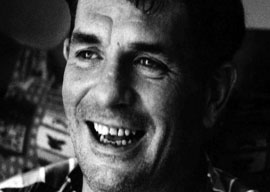
December 04, 2013

Jack Kerouac
John Clellon Holmes, the sanest of the beats, talks about a party given to celebrate the publication of On The Road. Jack was supposed to be the guest of honor. The king of the beats was a no-show. He called Holmes to say he was hung over and had the DTs. Holmes left the party to see him. Holmes:
He’d just had too much. He wasn’t boozed, really….It was just that he’s been interviewed by television people five or six times, newspaper people. He didn’t know who he was and he was just terrified. He was lying there in bed, holding his head.
I love the comments by Alene Lee, Jack’s former girlfriend who appears as Mardou Fox in The Subterraneans:
In the early fifties everyone had the feeling something was going to happen”waiting for someone to make a move….No one was quite prepared for the way all of this broke upon the scene. On The Road, pot smoking, LSD, the coffee shops started opening up and the poetry readings began. Suddenly there were millions more people on earth, and they all seemed to be coming to Greenwich Village. I had the feeling things were getting a little out of hand here….I just remember being terribly frightened and wanting to hold on to some inner reality and not get caught up.
Obviously, the situation was more complicated for Kerouac, because he was at the epicenter of it, the star, the avatar. So he flees to San Francisco. Odd the way truly famous writers cope with their fame.
In 1949, Hemingway is the most celebrated writer in America. He is ensconced in a suite at the Sherry-Netherland hotel on Fifth Avenue. He is drinking brut Champagne, snacking on caviar, and joking with Marlene Dietrich. He says he wants to get in and out of town quietly.
In 1960, Kerouac, at the pinnacle of his success, is passed out on the floor of a Skid Row hotel room in San Francisco, surrounded by empty bottles of sweet Tokay wine. He doesn’t eat. From one day to the next, he only drinks. He appears to be losing his mind.
When Kerouac picks himself up and makes it out to Big Sur, he does lose his mind. Not right away, but soon enough. Big Sur may contain the most harrowing description of a man going through hell that was written by the man himself. Fitzgerald’s Crack-Up pales in comparison. Kerouac clinically examines his pain, disgust, and utter confusion. It is poetry. His demons are real. It is terrifying.
Naturally, the movie cannot be expected to address that aspect of the book. It would be impossible and too depressing. As with Scott Fitzgerald and Ernest Hemingway, whatever there is to be learned from Jack Kerouac, stick with the printed word.